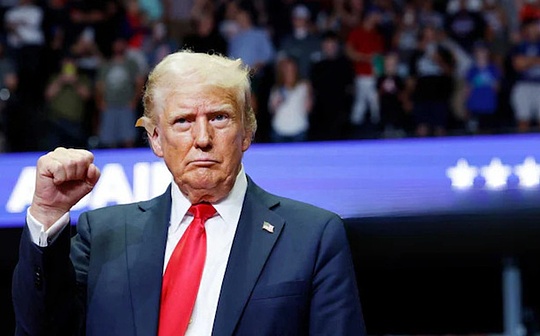Listed companies follow the trend and micro strategy to raise funds to buy Bitcoin may become a high-risk measure

Reprinted from chaincatcher
05/31/2025·3DOriginal title: "This metric shows the risks of chasing Michael Saylor's Bitcoin price strategy"
Author:Pedro Solimano , DL News
Compiled by: Felix, PANews
It all started with MicroStrategy. Today, it seems that a new public company will announce the stockpiling of Bitcoin or other cryptocurrencies every week.
But here’s a problem: investors are willing to give them a high valuation premium just because they buy Bitcoin.
What happens if their stocks don't rise because of this?
Take the Japanese company Metaplanet, which replicates Michael Saylor’s Bitcoin craze at MicroStrategy.
10xResearch said its share price is calculated based on the transaction price of Bitcoin at $596,154.
This is five times the current price of Bitcoin at about $106,000.
Before the company devoted itself to Bitcoin, Metaplanet was an economical hotel operator that later transformed into a blockchain infrastructure provider.
These businesses have been put on hold as the company rebrands and transforms into a Bitcoin reserve company.
"Is it time to short? The signals we are seeing are very similar to the inflection point in the past," 10xResearch wrote in a May 27 report.
One of many companies
In fact, Metaplanet is one of many companies that have followed the footsteps of Saylro, which has now been renamed Strategy.
On May 27, Trump Media and Technology Group (TMT) said it plans to raise $2.5 billion to buy Bitcoin.
This week, GameStop, a video game retailer that is famous for becoming a "meme stock", bought 4,710 bitcoins worth about $513 million (at current prices).
The share prices of both companies fell.
These new Bitcoin reserve companies have adopted a relatively simple strategy: raise funds by issuing convertible bonds and then use the money to buy bitcoin in large quantities.
Why did so many people suddenly emerge who followed Saylor? In short, this works significantly for the company.
Strategy's share price has risen 10 times since the implementation of the Bitcoin purchase program began in August 2020. The company holds more than 576,000 Bitcoins worth approximately US$63 billion.
Be cautious
But skeptics say there are good reasons to be cautious.
First, the idea that hoarding bitcoin or any other cryptocurrency on a company's balance sheet is a sure thing.
Noelle Acheson, a well-known macro analyst, said those who followed Saylor's belief that this strategy is risk-free and worrying. “Especially those who are only in the game when Bitcoin prices are high.”
When Strategy first bought Bitcoin, the transaction price was about $11,000, just about one-tenth of the current $107,000.
As this strategy becomes more prevalent, analysts and senior investors may focus on one specific indicator to remove noise—i.e. Net asset value (NAV).
NAV refers to the book value of assets held by a company.
When NAV is mismatched, it means that the company's share price is inconsistent with the actual value of its assets.
Take Metaplanet as an example.
The company holds 7,800 bitcoins worth about $830 million. However, the company has a market capitalization of $5.6 billion, which means a Bitcoin is worth $596,154.
In other words, investors pay five times the price of Bitcoin itself for indirect investment.
10xResearch analysts said, "A dangerous NAV twist is forming in the dark."
"We should restrain our enthusiasm for this gimmick." - Noelle Acheson
This means that Metaplanet's share price (which has risen 233% this month) may reverse the trend at any time.
But don't forget Strategy. Its frequent premiums may be beneficial to shareholders, but they are also worrying.
According to Strategy Tracker data, in 2020, investors valued Strategy stock more than six times its value as Bitcoin, and exceeded three times its value last year.
Hedge fund experts like legendary short seller Jim Chanos have been taking advantage of the phenomenon of NAV mismatch to short Strategy and buy more bitcoins.
Insider sale
At the same time, cryptocurrency reserve strategies are gaining momentum.
Just this week, Trump Media and Technology Group (TMT), the parent company of Trump's social media company, plans to raise $2.5 billion to invest in Bitcoin. But after the plan was disclosed, its share price plummeted 11%.
Why? Some may be worried that insiders will sell their shares.
The company said that possible future stock sales will include stocks of some insiders, such as a trust controlled by its son Donald Trump Jr., which holds 57% of the company's shares.
Meanwhile, many companies that follow Saylor (some of them are not even cryptocurrency companies) have valuations that are entirely dependent on the amount of Bitcoins they hold.
Semler Scientific manufactures medical equipment. After buying 581 bitcoins, its share price soared 30%.
Strive Asset Management, founded by former presidential candidate Vivek Ramaswamy, said it has raised $750 million for the purchase of Bitcoin, and another $750 million is in preparation.
Technology company ASST announced a merger with Strive Asset Management to transform into a Bitcoin reserve company, and its share price rose 194%.
Twenty One, a startup led by Bitcoin evangelist Jack Mallers and backed by Tether, SoftBank and Cantor Fitzgerald, has emerged with the sole purpose of absorbing as much bitcoin as possible.
The holding company, Cantor Equity Partners, has risen by more than 300% since its establishment in late April.
The company lists 76 risks associated with its business model, many of which are not common.
Nakamoto Inc, led by David Bailey, merged with a healthcare company to raise $700 million to acquire Bitcoin.
Now, macro analyst Noelle Acheson said it is reasonable for companies to include Bitcoin in their asset reserves.
But a large number of businesses have used Bitcoin as their sole reason for their existence, which has indeed triggered some overhype warnings.
The biggest risk faced by all these companies is macroeconomic risks. And in the Trump era, this is a huge factor.
Even Michael Saylor can’t escape the influence of geopolitics.
Tariffs, rising inflation and the Fed's uncertain interest rate policy have made the market nervous. Treasury yields remain high, which is particularly worrying, as it means investors may be waning confidence in the dollar as a safe-haven asset.
This is bad for risk-favorable assets such as stocks and cryptocurrencies.
All of this means that Saylor's multi-billion dollar Bitcoin purchases, which used to boost the top cryptocurrency, no longer works like this.
If the stock price of companies like Strategy or Metaplanet continues to rise, other followers may continue to emerge. This could further undermine the influence of such Bitcoin buying behavior.
“We should restrain our enthusiasm for this gimmick,” Acheson wrote.
“Innovative financial engineering has always emerged as a fascinating new tool that brings benefits at first, but inevitably becomes vulnerable as interest and risks are saturated.”


 jinse
jinse

